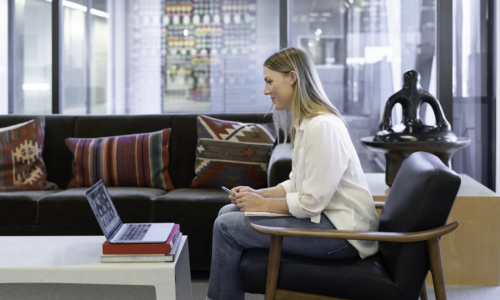How Online Clinical Consultation Groups for Therapists Work
By Shannon Heers
Once you become independently licensed as a therapist, your options for regular clinical supervision may lessen. Now that you no longer are required to get clinical supervision, who do you go to when you have questions about your clients? Many therapists turn to clinical consultation groups, and the exciting aspect of these groups is that you can find them online.
Ongoing professional development is key to continuing to stay relevant in the counseling field as well as help you prevent burnout. And there is no better way to get that ongoing support, with a clinical focus, than by joining an online clinical consultation group. You can fit a group in between 2 of your clients or on your lunch break, with no need to travel!

The Benefits of Online Clinical Consultation Groups
There are many advantages to participating in an online group with your peers. Especially if you are a therapist in private practice, you may be missing the camaraderie of a team. Here are some more positives about joining an online clinical consultation group:
- Peer support and collaboration
- Expanding your clinical knowledge
- Gaining diverse perspectives on your cases
- Enhancing your therapeutic skills
- Combating burnout
In the virtual clinical consultation groups that I have and continue to attend, I’ve also found friendship, trusted referral sources, and support for the tough days that happen.
One of the best things about online clinical consultation groups is that there is no need for you to leave the comfort of your home or office to attend. Virtual groups can have the same benefits as in-person groups, without the hassle of navigation, finding a parking place, or fighting traffic. It is just so convenient to be able to eat lunch while you are consulting with professionals on your cases!
The Structure of Online Clinical Consultation Groups
 Of course, every consultation group will have its own style and culture. And, depending on the size of the group, there may be more of a training or socializing/connecting focus. But in general, there are some commonalities in structure that many clinical consultation groups have:
Of course, every consultation group will have its own style and culture. And, depending on the size of the group, there may be more of a training or socializing/connecting focus. But in general, there are some commonalities in structure that many clinical consultation groups have:
- Introductions, check-ins
- Case presentation(s) and discussion
- Other discussion topics
- Closing the meeting
And remember, there are no rules about how long each consultation group is, the frequency of meeting, and the size. It is totally dependent on the group and who facilitates or organizes the group.
There are a few different secure and confidential platforms that online clinical consultation groups can be run on. The most common is probably Zoom or Google Meets, but you can also meet via Facebook Groups or other social media networking sites.
The size of the group can impact the group structure, as well as the benefits you may get out of the group. Usually the group is by invitation only, and some groups may be closed to new members. For example, the online clinical consultation groups that we run at Firelight Supervision are limited to 4 group members each. This is so that each group member has time to present a case or ask a question to the group, every single group consultation session.
I’ve also seen consultation groups that are open to anyone to join, and have 20-30 therapists attend. With a group this large, there is usually a training or presentation by someone that will benefit the therapists in the group. The more group members in the group, the more structure is needed to keep on task and manage the time efficiently.
Finding the Right Online Clinical Consultation Group
Each therapist’s needs and desires regarding clinical group consultation may differ. There are several things to ask yourself before you start to seek out an online clinical consultation group. Here are a few tips for therapists seeking group consultation:
- How often do you want to meet?
- Does the group meet at a time that works for your schedule?
- How long do you want each group session to be?
- Do you want a 100% peer group or a supervisor-led group?
- Do you have the time and money (if it is a paid group) to commit to the group for the long-term?
- What clinical specializations do you want to discuss in your group?
- Do you want a case consultation group or more of a networking or business consultation group?
Whew, that’s a lot of questions to ask yourself to prepare for finding the right-fit clinical consultation group. But it’s worth it – a bit of preparation can save you time in the long run if you find yourself in a group that you are not benefiting from.
The main question, however, to ask yourself is, what do I want to accomplish with group consultation? Do you want to learn more about a particular theoretical orientation, or get support for your tough cases regardless of therapeutic modality? Do you want socialization and connection with your peers? Or all of the above? Knowing what you want to get out of your online clinical consultation group will help you reach your goals.
Knowing who your group facilitator is going to be is also important. If you are joining a supervisor-led group, do you like the style of the clinical supervisor? Does that supervisor have enough expertise and experience to run a consultation group of licensed therapists? Make sure you evaluate the facilitators’ qualifications before jumping into your group.
And if you’re joining a completely peer-led group, are you comfortable with who is facilitating the group or even taking a turn with the group facilitation? Some peer consultation groups rotate roles of group facilitator, timekeeper, etc. each group, so that no one person is always in the lead. That may be attractive to you, or not. Sometimes, we just want to show up and get our consultation needs met and then leave.
Finally, when looking for the right online clinical consultation group for you, make sure that the group space and environment feels safe and comfortable. You also want to ensure that everything said within the group is confidential, and that you are not releasing PHI (protected health information) about any of your clients. If you feel uncomfortable with the level of sharing about clients, this may not be the group for you.
Participation in Online Clinical Consultation Group
 You may be wondering, do I have to participate in the group? Of course not! You can observe for a while and then when you feel comfortable, start jumping in, as long as that is ok with other group members. You will get the most out of the group the more you participate, but no one is forcing you to do that. If you tend to be hesitant in new group settings, here are some ideas to start engaging effectively in your group:
You may be wondering, do I have to participate in the group? Of course not! You can observe for a while and then when you feel comfortable, start jumping in, as long as that is ok with other group members. You will get the most out of the group the more you participate, but no one is forcing you to do that. If you tend to be hesitant in new group settings, here are some ideas to start engaging effectively in your group:
- Actively listen and provide constructive feedback
- Respect confidentiality and privacy
- Be open to diverse viewpoints
- Discuss common challenges that therapists face and ways to address them
- Present a case yourself
Try just one of these things and you’ll find yourself feeling more confident in every group. Most of the time, therapists want to be in consultation groups, so there is a mutual feeling of support and ongoing learning.
What do you think? Are you ready to start engaging with your peers in your consultation group? By now, you know the benefits of online clinical consultation groups, how online clinical consultation groups are structured, and how to find the right group for you. You have some great tips on how to participate in your groups and engage with your peers. Now, all you need to do is get started!
If you are ready to join an online clinical consultation group today, check out the groups that Firelight Supervision offers. We have generalized case consultation groups for therapists who work with adults and therapists who work with children and families. We also offer trauma-specific consultation groups and consultation groups for therapists who identify with having ADHD, to name a few others. We’d love to hear from you if you are interested!
How we can help
Are you seeking peer consultation within a community of other like-minded private practice therapists? Check out our Clinical Consultation Community, which offers individual and group consultation, monthly clinical trainings, and more! What is holding you back? Get started today with peer consultation!
Download our Free Burnout Prevention Checklist! You can also sign up for a free phone consultation to discuss options and learn more about us!
Author Bio
 Shannon Heers is a psychotherapist, approved clinical supervisor, guest blogger, and the owner of a group psychotherapy practice in the Denver area. Shannon helps adults in professional careers manage anxiety, depression, work-life balance, and grief and loss. Follow Firelight Supervision on Instagram and Facebook.
Shannon Heers is a psychotherapist, approved clinical supervisor, guest blogger, and the owner of a group psychotherapy practice in the Denver area. Shannon helps adults in professional careers manage anxiety, depression, work-life balance, and grief and loss. Follow Firelight Supervision on Instagram and Facebook.



